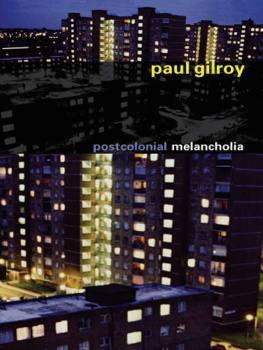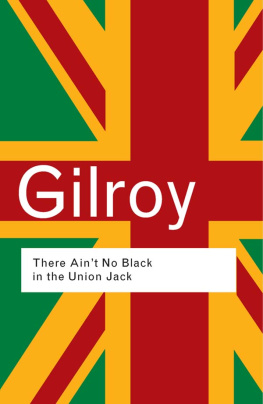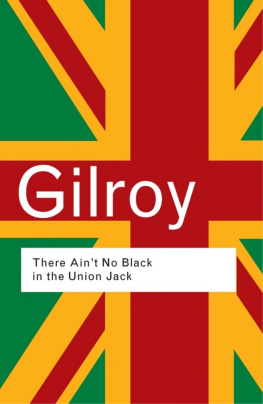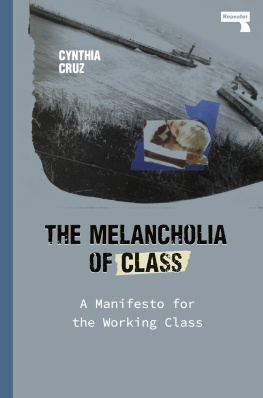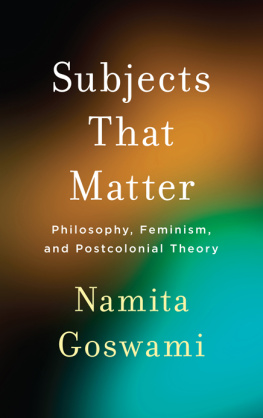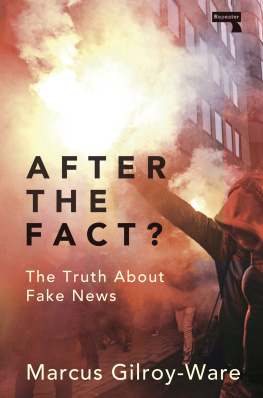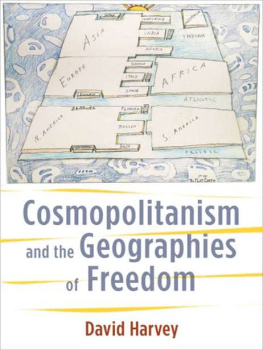Paul Gilroy - Postcolonial Melancholia (The Wellek Library Lectures)
Here you can read online Paul Gilroy - Postcolonial Melancholia (The Wellek Library Lectures) full text of the book (entire story) in english for free. Download pdf and epub, get meaning, cover and reviews about this ebook. year: 2004, publisher: Columbia University Press, genre: Politics. Description of the work, (preface) as well as reviews are available. Best literature library LitArk.com created for fans of good reading and offers a wide selection of genres:
Romance novel
Science fiction
Adventure
Detective
Science
History
Home and family
Prose
Art
Politics
Computer
Non-fiction
Religion
Business
Children
Humor
Choose a favorite category and find really read worthwhile books. Enjoy immersion in the world of imagination, feel the emotions of the characters or learn something new for yourself, make an fascinating discovery.
- Book:Postcolonial Melancholia (The Wellek Library Lectures)
- Author:
- Publisher:Columbia University Press
- Genre:
- Year:2004
- Rating:3 / 5
- Favourites:Add to favourites
- Your mark:
- 60
- 1
- 2
- 3
- 4
- 5
Postcolonial Melancholia (The Wellek Library Lectures): summary, description and annotation
We offer to read an annotation, description, summary or preface (depends on what the author of the book "Postcolonial Melancholia (The Wellek Library Lectures)" wrote himself). If you haven't found the necessary information about the book — write in the comments, we will try to find it.
Postcolonial Melancholia (The Wellek Library Lectures) — read online for free the complete book (whole text) full work
Below is the text of the book, divided by pages. System saving the place of the last page read, allows you to conveniently read the book "Postcolonial Melancholia (The Wellek Library Lectures)" online for free, without having to search again every time where you left off. Put a bookmark, and you can go to the page where you finished reading at any time.
Font size:
Interval:
Bookmark:

Postcolonial Melancholia
The Wellek Lectures
Previously Published Wellek Library Lectures
The Breaking of the Vessels
Harold Bloom
In the Tracks of Historical Materialism
Perry Anderson
Forms of Attention
Frank Kermode
Memoires for Paul de Man
Jacques Derrida
The Ethics of Reading
J. Hillis Miller
Peregrinations: Law, Form, Event
Jean-Franois Lyotard
Reopening of Closure: Organicism Against Itself
Murray Krieger
Musical Elaborations
Edward W. Said
Three Steps on the Ladder of Writing
Hlne Cixous
The Seeds of Time
Fredric Jameson
Refiguring Life: Metaphors of Twentieth-Century Biology
Evelyn Fox Keller
A Fateful Question of Culture
Geoffrey Hartman
The Range of Interpretation
Wolfgang Iser
Historys Disquiet: Modernity and Everyday Life
Harry Harootunian
Antigones Claim: Kinship Between Life and Death
Judith Butler
The Vital Illusion
Jean Baudrillard
Death of a Discipline
Gayatri Chakravorty Spivak
Postcolonial Melancholia | Paul Gilroy |

Columbia University Press New York
Columbia University Press
Publishers Since 1893
New York Chichester, West Sussex
cup.columbia.edu
Copyright 2005 Paul Gilroy
All rights reserved
E-ISBN 978-0-231-50969-5
Library of Congress Cataloging-in-Publication Data
Gilroy, Paul.
Postcolonial melancholia / Paul Gilroy.
p. cm. (Wellek library lectures)
Includes bibliographical references and index.
ISBN 0231134541 (cloth : alk. paper)
1. Pluralism (Social sciences)Great Britain. 2. Race discriminationGreat Britain. 3. Minorities Great Britain. 4. National characteristics, British.
I. Title. II. Wellek Library lectures at the University of California, Irvine.
HM1271.G54 2004
305.8'00941dc22 2004052692
A Columbia University Press E-book.
CUP would be pleased to hear about your reading experience with this e-book at .
For Marcus and Cora
and in memory of Rachel Corrie and Thomas Hurndall
Editorial Note
The Wellek Library Lectures in Critical Theory are given annually at the University of California, Irvine, under the auspices of the Critical Theory Institute. The following lectures were given in May 2002.
The Critical Theory Institute
James Ferguson, Director
Contents
Im waiting for the traffic lights to change
Waiting not to be asked for change
Waiting for this country to change
MC Pitman , Waiting
There was a depressing and deeply symptomatic counterreaction against the publication of The Future of Multi-Ethnic Britain: The Parekh Report in 2000. The Blair governments indignation was directed at what it saw as the reports unpalatable suggestion that the language and symbols of Englishness and Britishness had a tacit racial connotation which made them exclusionary and synonymous with whiteness. Observing that parochial pseudo-debate unfold from a liberating distance, I was amused and surprised to discover that, while I had not made it into the index, the reports peculiarly controversial view had been warranted by a citation to some earlier work of mine. The reports tepid proposition had proved more contentious than its authors could reasonably have anticipated. Perplexed by how their obvious suggestion had aroused such scorn, I turned to a related problem: What did the reaction against it reveal about the state of the country as it struggled to come to terms with the disturbing official diagnosis of its institutional racism provided by Sir Stephen MacPhersons report on the murder of Stephen Lawrence?
Its impossible to know whether the Labour Home Secretaries, Straw and Blunkett, had noticed the perennially troublesome crowd at England football matches humming the theme tune from, The Dambusters , a definitive World War II film produced to elevate the national mood between Korea and Suez that reemerged at the centurys end as a postmodern encomium to British pluck, steel, and eccentricity. We can only imagine what our modernizing leaders must have felt when they spotted the same fans acting out the motions of bombers swooping in on Germany to deliver their deadly World War II payloads. Why was this postwar crowd so drawn to the iconic figure of Richard Todd, in the role of Wing Commander Guy Gibson, with his faithful dog Nigger at heel, readying the heroes of 617 squadron to go and bomb the Gerries. I wondered if the tribunes of New Labour squirmed as I did at the choice of that overloaded word, nigger, as the bombers code word for a successful strike on the Nazi damand if they could see that the renewed popularity of that famous film might itself point to problems with the culture of late-twentieth-century British nationalism. Baffled by their indifference to these issues, I decided to write another book about England in the hope that it might shed some light on these controversies and perhaps endow them with elements of a cosmopolitan history that they manifestly lacked. I thought this was a project that might even be enhanced by a measure of distance from the frustrations of living in the old country.
The validity of the exercise was confirmed when the New York towers fell and Blairs belligerent, sanctified, and resolutely Churchillian Britain was aligned politically with the worst and most backward features of the latest U.S. imperial adventure. Even after that low ebb, half the countrys yearning to be a different kind of place seemed worth noting, pausing over, and thinking with. A new set of issues had emerged to prompt the remaking of the nations relationship with its imperial past and to feed the hope that its buried and disavowed colonial history might become useful at last as a guide to the evasive, multicultural future prefigured everywhere in the ordinary experiences of contact, cooperation, and conflict across the supposedly impermeable boundaries of race, culture, identity, and ethnicity.
As I came to the end of the project during the summer of 2003, several British newspapers were unexpectedly occupied by the tragic plight of Ingrid Nicholls. This forty-six-year-old black, British mum was a prospective amputee. She was catapulted up the news agenda because of a second injury that compounded the trauma involved in being told that she was about to lose her leg as a result of damage originally sustained during childhood. The additional hurt derived from the prospect of either being fitted with a pink, prosthetic limb that did not match the rest of her body or of having to find 3,000 to pay for a brown one as a private patient outside the operations of the National Health Service. Instead of a matching artificial leg, her local Health Authority had offered her counseling.
The Health Authority said that it lacked sufficient resources to fund the provision of matching prostheses to its black patients. Her conflict with it caught the nations attention immediately and provided a measure of the countrys racial temperature a decade after the Lawrence murder. Without anything being said openly, Mrs. Nicholls experience was projected as a powerful symbol of the difficulties involved in nurturing a multicultural society and adapting its fading welfare state to the diverse needs of a multiracial patient body. However, Mrs. Nicholls plight resonated strongly because it suggested a larger and more painful adaptation: the gradual transformation of Britains ailing body politic in response to the demands of a black settler population whose contested right to belong was increasingly being seen as incontrovertible. One measure of that great change lay in the way the shameful refusal of a matching limb was described as an affront to her dignity. The story of these injuries seemed to be of a different order than the traditional melancholic fare: racist murder, the criminalization of the black community, and the misdeeds of white-supremacist police officers that were occasionally captured, but much more usually missed, by the hidden cameras. This was not the usual story. It was not another sad instance in which the truths of racial division and hierarchy, already known and absolutely familiar but always denied and forgotten, burst out into the light to trigger shock, disgust, and a new bout of emotional self-flagellation.
Font size:
Interval:
Bookmark:
Similar books «Postcolonial Melancholia (The Wellek Library Lectures)»
Look at similar books to Postcolonial Melancholia (The Wellek Library Lectures). We have selected literature similar in name and meaning in the hope of providing readers with more options to find new, interesting, not yet read works.
Discussion, reviews of the book Postcolonial Melancholia (The Wellek Library Lectures) and just readers' own opinions. Leave your comments, write what you think about the work, its meaning or the main characters. Specify what exactly you liked and what you didn't like, and why you think so.

